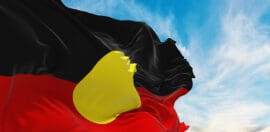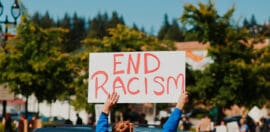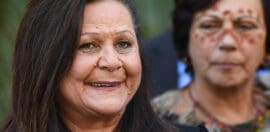Philanthropy backs Voice

Picture: BIANCA DE MARCHI, AAP IMAGES
27 February 2023 at 6:41 pm
Philanthropic funding will be crucial to the yes and no campaigns in the absence of public funding.
The Yes campaign for the Indigenous Voice to Parliament is getting a boost, with a sizeable donation from the philanthropic community.
The Paul Ramsay Foundation announced a $5 million donation to the cause during the Yes campaign launch last week.
In a statement, the foundation explained how the donation fits with its mission to help “build an Australia where there is equitable opportunity for all people and communities to thrive”.
“An Aboriginal and Torres Strait Islander Voice is a vital step toward achieving this vision, and we are proud to support the Yes campaign in the upcoming referendum,” the statement said.
“We are supporting the Yes campaign because we have listened to the voices of First Nations communities, articulated through the Uluru Statement from the Heart, which followed a long process of engagement and consultation with Aboriginal and Torres Strait Islander peoples.”
The organisation urged others to “listen, engage and support” the Voice.
The federal government has stated that no public funding will be provided to either the yes or no camps.
According to Philanthropy Australia, this means philanthropy will “play a critical role” in both educating and influencing voters.
Sector still says ‘yes’
Several not for profit organisations announced their support for the Voice last week, coinciding with the launch of the Yes campaign.
See more: To Voice or not to Voice, that is the question
Diversity Council Australia (DCA) CEO Lisa Annese and Aboriginal Liaison Officer Simone Empacher Earl attended the launch of the Yes campaign, having announced its support for the Uluru Statement from the Heart in 2019.
The council has committed to holding events and providing information to members to “assist them in actively participating in the Yes campaign”.
“DCA supports constitutional recognition through a Voice to Parliament because it is a fair and practical change that will give Aboriginal and Torres Strait Islander people the chance to have a say direct to the Parliament on policies that impact their lives,” Annese said.
“Australia will be more prosperous as a nation when it is cohesive and inclusive. Making Australia more inclusive is the vision of DCA. Supporting Yes for the Voice and encouraging our members to be active in the Yes campaign is a way we can tangibly bring life to this vision.
“Genuine inclusion must begin with reconciliation. There can be no genuine workplace inclusion while our First Nations Peoples are excluded from opportunities, and we as a nation do not address race relations, equality and equity, unity, institutional integrity, and historical acceptance by including First Nations People in the Constitution.”
Kate Russell, Awabakal woman and chair of the Diversity Council Australia Aboriginal and/or Torres Strait Islander External Advisory Panel, said listening and consulting are crucial to workplace inclusion.
“It requires respect, it centres the voices of those who are marginalised and have lived experience. The Voice, at its simplest, looks to deliver the same, through our Constitution. This should be welcomed and celebrated,” she said.
Lowitja Institute, the community-controlled Aboriginal and Torres Strait Islander research institute, has welcomed progress on the Voice.
CEO adjunct professor Janine Mohamed said the establishment of a Voice to Parliament would provide a strong foundation for the urgent work to improve health and wellbeing outcomes for Aboriginal and Torres Strait Islander peoples.
Lowitja Institute Chair, Selwyn Button, added: “the Voice will have a practical impact on the lives of First Nations Australians, because we will make better policies when our people are heard.
“It would enable even our most vulnerable Aboriginal and Torres Strait Islander community members – who have long been absent from federal government decisions – to have a seat at the table when decisions that directly affect them are being made.
“The Voice will help fix a glaring omission of Aboriginal and Torres Strait Islander people in the Australian Constitution – our country’s birth certificate. That can only be unifying moment for the nation and a long-awaited one for our peoples,” he said.
A Voice to Parliament will provide a strong foundation for the urgent work to improve health and wellbeing outcomes for Aboriginal and Torres Strait Islander peoples. #VoicetoParliament #UluruStatement @ButtonSelwyn1https://t.co/tKYfSwpa07 pic.twitter.com/ebcv2GJ9vy
— Lowitja Institute (@LowitjaInstitut) February 22, 2023
The Australian Reconciliation Network also affirmed its support for the Uluru Statement from the Heart and the Voice to Parliament.
“We stand firm in our belief that answering the calls in the Uluru Statement from the Heart is a critical step on our path to a reconciled nation. The Statement calls for a constitutionally enshrined Voice to Parliament, and a Makarrata Commission to supervise a process of agreement-making between governments and First Nations and truth-telling about our history,” the network said in a statement.
“The Uluru Statement was generous in its invitation to the Australian people, and makes clear the reason reform of the Constitution is needed… This year, we have the opportunity to make history, and answer that invitation at a referendum.”
And NGO Recruitment has thrown its support behind the Yes campaign, and has compiled resources to help others understand the process.
“Having Aboriginal and Torres Strait Islander people in parliament who understand the real challenges within Indigenous communities and know the appropriate action to take in order to deliver meaningful results, is why Voice to Parliament is so important,” the organisation said in a statement on its website.







